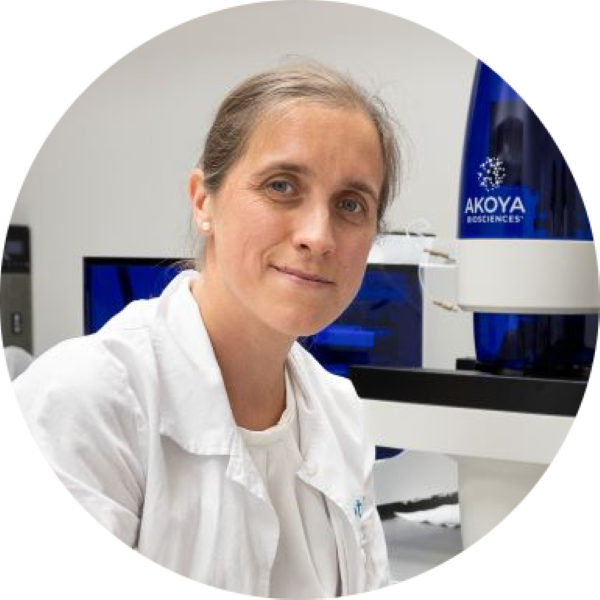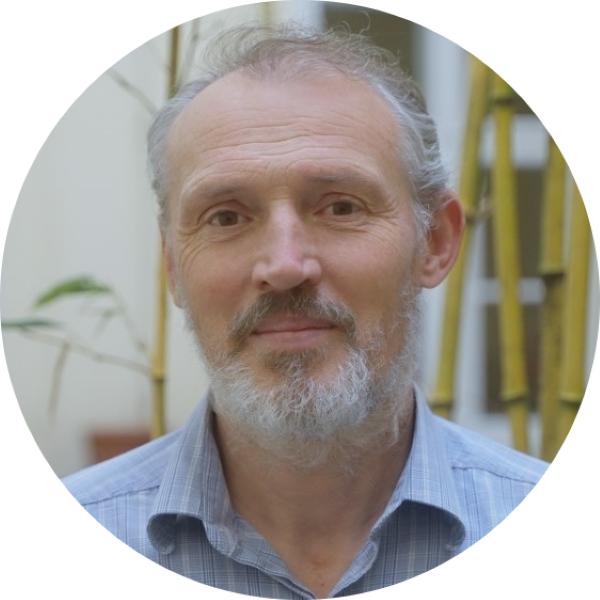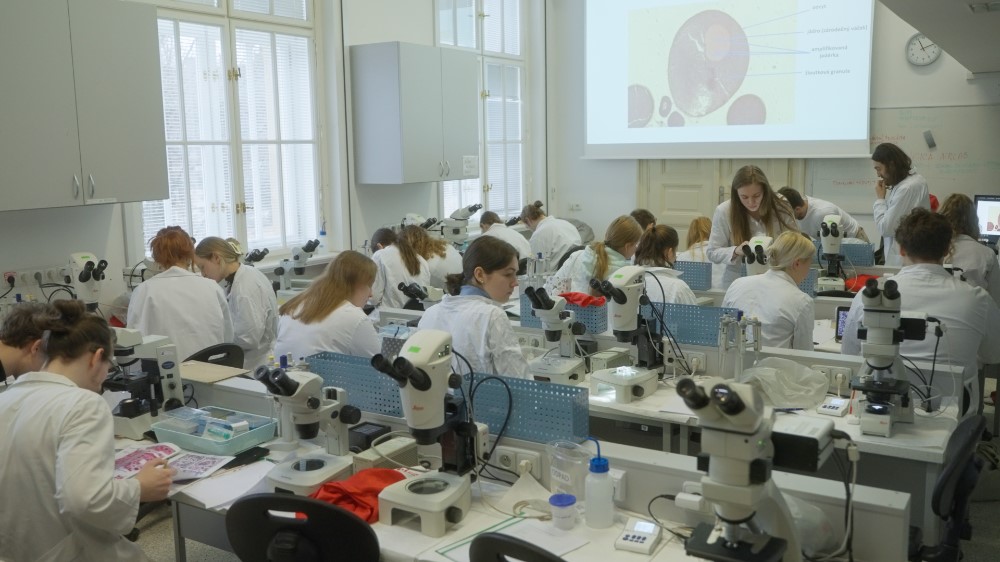This September marks the conclusion of a six-month internship for students from Sorbonne Université in France, facilitated by the 4EU+ Alliance and the Erasmus programme. The internship was offered to Sevval Ayhan, Thrinethra Shankar (Thri for short), and Regina Shaikhutdinova as part of their Master's studies, thanks to the valuable collaboration between the Faculty of Science at Charles University and Sotio Biotech Laboratories.

In the lab: promising Master’s students Sevval Ayhan (left) and Thrinethra Shankar with immunologist Jitka Palich Fučíková (right).
Forum magazine spoke with Professor Jan Černý from the Department of Cell Biology at Charles University's Faculty of Science, who supervised the students at the university, as well as Professor Jitka Palich Fučíková, under whose guidance at Sotio Biotech the students gained hands-on experience in tumour immunology.
What was the initial impulse that attracted the girls to come to Prague?
Jan Černý: This year, we celebrate the fifth anniversary of our collaboration with Sorbonne Université in the prestigious master's program From Fundamental Molecular Biosciences to Biotherapies. In 2019, we were honoured to be asked if we could help with teaching immunology, including implementing semester-long internships in selected laboratories. This request was the result of our efforts to teach a range of advanced and basic immunology courses in English.
Word spread, and we now regularly receive four students each summer semester. These students follow a rigorous immunology programme at the Faculty of Science and various immunology institutes. We are very pleased that they were satisfied with the conditions and are recommending the stay in Prague to new students.
 Jitka Palich Fučíková: As part of the Erasmus program at the Faculty of Science, there is also an internship in a laboratory of the student's choice. The students chose Sotio both for the opportunity to engage in translational research within a biotechnology company and based on the recommendation of a colleague who interned with us in previous years and will return next year to the Second Faculty of Medicine at Charles University and Sotio’s laboratories for her doctoral studies in medical immunology.
Jitka Palich Fučíková: As part of the Erasmus program at the Faculty of Science, there is also an internship in a laboratory of the student's choice. The students chose Sotio both for the opportunity to engage in translational research within a biotechnology company and based on the recommendation of a colleague who interned with us in previous years and will return next year to the Second Faculty of Medicine at Charles University and Sotio’s laboratories for her doctoral studies in medical immunology.
What exactly did the Master's students work on in the lab?
JPF: The students had the opportunity to participate in ongoing scientific projects which mainly focus on the role of the immune system in cancer treatment. During the internship, they became familiar with advanced methods in tumour immunology, such as digital pathology, molecular sequencing, and working with experimental animal models. They also learned the basics of scientific work and were able to collect and interpret their own scientific data.
At the same time, we strived to accommodate students’ specific requests during their scientific internships. Regina, for example, expressed an interest in furthering her knowledge in bioinformatic data processing, so she spent most of her time analysing results from molecular sequencing, including single-cell sequencing and spatial sequencing of tumour tissues. Sevval and Thri focused on analysing tumour tissues from ovarian cancer patients using advanced digital pathology technologies and working with mouse models.
And the Faculty of Science mainly provided lectures, correct?
JČ: Yes, the students attended the Immunology program, where we offer quite a broad selection of lectures, such as Functional Immunology, Animal Models in Immunology, Advances in Immunology, Systems Immunology, or Cytometry. It’s important to note that most of the credits that Master's students need to earn come from their research internship. Our aim is always to select top workplaces and outstanding mentors – hence, Sotio under the guidance of Prof. Palich Fučíková.
Can we talk about results? What did the intern students gain?
JPF: Definitely. The outcome of their work is not only gaining new knowledge but also publishing their results in prestigious scientific journals, as was the case with their colleagues in the past. Additionally, students have the unique opportunity to regularly discuss their work with colleagues from various departments at Sotio Biotech and understand the preclinical and clinical testing that takes place during the development of new cancer drugs.
Did the students meet your expectations? How well did they fit into the established research team?
JPF: Like in previous years, the students were a significant asset to the entire research team. Thanks to their interest and the support of their colleagues, they joined ongoing research projects, which, among other things, focus on the role of so-called tertiary lymphoid structures (structures in tumour tissue resembling lymph nodes) in immunotherapy for solid tumours, the importance of NK (Natural Killer) cells in tumour tissue of immunologically active and passive tumours, and the possible combination and timing of standard chemotherapy with immunotherapy. They actively presented their work during scientific seminars, and these results form an integral part of the upcoming scientific publications.
JČ: In my view, it’s not all that difficult. We are actually surprised by the interest from international students in our fields. In the undergraduate Science programme, we can choose from very high-quality applicants from all over the world, and the same goes for the Immunology program. In the doctoral programs, international applicants even dominate. At our Department of Cell Biology, we have students from more than 10 countries. They seem quite satisfied. Many plan to pursue a scientific career in the Czech Republic. By the way, we have even had students apply for doctoral studies in immunology after completing our “Sorbonne internship” (smiles); that is not uncommon.
JPF: Thanks to the support of the Faculty of Science, Charles University, and the PR department of Sotio Biotech, we are currently seeing considerable interest from international students for long-term internships in our lab. Students recognise that they have a unique opportunity to engage in translational research at a biotechnology company with the potential for clinical application. This opportunity allows them to cross the boundaries of the purely academic environment and opens doors to further studies or careers in biotechnology.
What’s next? Do you plan to continue the collaboration?
JPF: Yes, we will continue such cooperation, especially through our connections with scientific groups in Paris at the Centre de Recherche des Cordeliers, where some students proceed with their M2 program and complete their theses.
Can you estimate how significant this experience was for the students and for CU?
JČ: They would have to answer that themselves. For us, teaching outstanding students from a prestigious foreign university is very inspiring. There is no question it has a “snowball” effect on the host institution. The subjects evolve, the portfolio of courses taught in English expands, and our students gain inspiring study partners. Last but not least, this activity strengthens the ties between our faculty and other research institutions – not only from the Academy of Sciences or medical faculties – but also from the private sector, with Sotio being an important example!

All in a day's work: Sevval and Thrinethra discuss the hands-on experience and in-depth knowledge gained from working at Sotio Biotech.
How did the students themselves view the opportunity and their time in Prague? They told us in their own words, just how important the stay was and how much they had learned. Forum spoke to Sevval Ayhan and Thrinethra Shankar, with Professor Jitka Palich Fučíková occasionally providing additional input.
Forum: How did you come to the subject of Immunology and related research which eventually brought you to Prague?
Thrinethra Shankar: I think we both have a different answer for this: in my Bachelor’s I was focused on biotechnology but then I took a course on immunology and I was like ‘Oh my god, this is what I want to do!’ and so I applied to Sorbonne University and my first semester there was a more general focus, with a cellular biology molecular component, so a bit of everything. But they knew in advance that I wanted to focus on immunology once I came here to Charles University, and it was here that I really began to focus on it.
What was it about immunology that spoke to you, that caught your imagination?
TS: Normally I am pretty curious and I am drawn to different topics: but here I was really drawn to how these cells interact. It was also a nice background for medicine. In medicine, doctors work with patients to try and cure them: with this, you get to see the whole framework behind it and learn how they come up with these treatments and I thought that was very cool.
What about you, Sevval?
Sevval Ayhan: My Bachelor’s was about molecular biology and genetics and I didn’t come across a specific immunology lecture but I came across it throughout my studies and even did presentations about immunotherapy because they are quite new and a lot has changed over the last 20 years. After graduation, I worked for a company in Turkey within the university, focusing on developing Car-T cells (Chimeric Antigen Receptor T-cells) which are used in immunotherapy used to treat certain cancers – editor’s note). In the process I became more and more interested in immunology and immunological treatments specifically and I realised that I wanted to continue and to become an academic.
I am the first generation in my family that studied at university and I had a lot of issues during my university years: I didn’t have my network and people to consult and I wanted to find a way to help other students. Academia was the answer. I applied at Sorbonne and chose immunology and immunology therapies which led to my internship in Prague. I wanted to work at a place where I could learn more and Sotio Biotech, with its emphasis on research, gave me a lot of what I needed. I really became interested in cancer immunology and Dr Jitka Palich Fučíková’s own work was very inspirational.
Professor Fučíková, would you like to add a few details?
Jitka Palich Fučíková: Just this – if we are talking about Car-T cells, next to immunotherapy inhibitors these are another direction where we are taking the patient’s T-cells. As a form of therapy, it is technically fairly demanding: we have to take the patient’s blood and Car-T cells are quite effective in some blood cancers but not so effective against solid carcinomas. Academic teams and also biotech and pharma teams are focusing on Phase 2 clinical trials where we could develop Car-T cells also effective against solid carcinomas. That is an important point of research here at Sotio.
Thank you for that. (to the students) I understand that along with Prague, you were offered other possibilities as well?
TS: That’s right: we had the option of choosing between Prague and Sao Paolo but we both chose Prague.
Tell me about the atmosphere here: how used to being in the lab were you before coming to Sotio?
TS: I had experience from my Bachelor’s and other internships but I would say that working here was really cool. Because it is like a ‘melting pot’ of different scientists from all over the world and you can ask everyone the same question and each will give you a similar but slightly different answer. It really pushes you to think. I also really appreciated that any time I had a specific question, whether scientific or something mechanical relating to the process I was doing, I always got a quick answer. No matter how small the question was I always got a helpful response and that creates a really nice back and forth between everyone here and it made me feel very comfortable.
SA: I completely agree. I liked the environment because everyone was very friendly, there were other interns too so we could talk with each other and discuss work and our futures. We also had weekly meetings within the research group so we learned also about other research projects that helped me to appreciate other projects and expanded my knowledge of the topic. Every project looks at the tumour microenvironment from a different perspective and we were allowed to ask questions and that helped a lot.
TS: It is very student friendly and Prof. Jitka was extremely helpful and open, realising that we were new in the field and had to learn new techniques. Also, within the industry. Every week we had a seminar with different personnel from different branches, whether pre-clinical to HR, and we really were able to see the different parts of the company and how they worked. The billion steps that connect the departments, how you market something, how everything works. We even had a special lecture with Jitka herself covering specific theory. It was really very helpful.
Relocating to Prague was not only about your classes at the Faculty of Science and your work here but also discovering a new city. How did you enjoy time off?
TS: I was here on Erasmus but this was my second time… and that helped because I already knew the city a bit. I appreciated that I had a bit more time to explore and discover…
So you went to the Castle! (laughter)
TS: Of course! I have been to the Castle, but I admit I haven’t been inside. It is huge. This time I learned a lot more about the cuisine: when I was first here the Covid pandemic hit and everything was pretty much shut down. This time I got to know a lot more about people: because of Sotio, I met many Czechs themselves and got to learn more about the language and the culture and I am very thankful for that.
SA: I originally came here as a tourist for just three days but this time was different: you have to live in a place to truly understand the culture. And I am very happy because Istanbul, where I lived before, was very crowded and Paris, where I moved next, was also. By contrast, Prague is quieter, with a great tram system, people are very nice and you get to see the real beauty of Prague, parks and so on, which are not immediate tourist sites.
To sum up and return to your internship at Sotio: what it did it feel like to know you were contributing to research that could lead to important advances in treatment?
SA: It feels really good. In my Bachelor’s I decided I wanted to pursue bench-side research in translational medicine. In these projects I was able to do that and I can see how my research can be helpful for patients. As I said, I am first-generation so while my family doesn’t understand what basic research can do, when I say I contribute medicines that can actually help someone and that make them happy and makes me happy too.
Also, it was fascinating to get on board an existing research that was coming to an end, because research usually takes years and it would be easy to miss the results To be here for a six-month period and to be able to [see something approach the finish] was fascinating.

Professor Jitka Palich Fučíková provided key guidance for the Master's students as they took part in ongoing research at Prague's Sotio Biotech.
Prof. Jitka Palich Fučíková: A normal project can take 3 – 5 years but one year might be just the very intense revision process before publishing results.
SA: We were lucky to be able to see all the data and learn a lot about the previous work.
| Professor Jitka Palich Fučíková |
| Jitka Palich Fučíková is a graduate of the Faculty of Pharmacy, Charles University in Hradec Králové. During her doctoral studies at the Second Faculty of Medicine, she focused on tumour immunology. She completed several foreign internships: at the Centre de Recherche des Cordeliers in Paris and the Ludwig Institute for Cancer Research in Melbourne. Today, she leads her own research group in tumour immunology at the biotechnology company Sotio Biotech and teaches at the 2nd Faculty of Medicine. She is the author of dozens of foreign publications with significant citation impact and two international patents. For her work, she has received numerous awards, including the Neuron Award in Medicine, the Czech Head Award, the Discovery Award, and the L'Oréal UNESCO Award for Women in Science. |
| Professor Jan Černý |
| Jan Černý is a graduate of the Faculty of Science, Charles University, in molecular biology and genetics. During his doctoral studies at the Faculty of Science – in immunology, he studied membrane microdomains. Today, he studies the immune system using a mouse model with MHCII-EGFP knock-in under various microbiome conditions, characterizing maternal-fetal microchimerism, and searching for molecular mechanisms of bioactive secondary metabolites. He also focuses on advanced microscopy techniques for observing processes in living cells and studying histological organisation using Light Sheet Microscopy. He completed internships at Harvard Medical School and Harvard University. He is a member of numerous scientific councils and the recipient of prestigious awards, including the NATO Science Fellowship, the Czech Academy of Sciences Award, the Siemens Prize, and the Minister of Education Award for Teaching Activities. He has been a member of the Learned Society of the Czech Republic since 2022. |

























